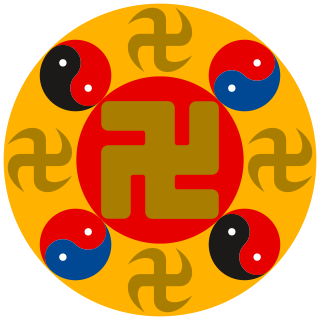The Global Internet Freedom Consortium is a consortium of organizations that develop and deploy anti-censorship technologies for use by Internet users in countries whose governments restrict Web-based information access. The organization was reportedly begun in 2001 by Chinese-born scientists living in the United States reacting against Chinese government oppression of the Falun Gong.
The organization states that the majority of its funding comes from its members. In May 2010, the group was offered a $1.5 million (USD) grant from the United States Department of State. [1] This move received criticism from representatives of the Chinese government. [2]

Falun Gong or Falun Dafa is a new religious movement. Falun Gong was founded by its leader Li Hongzhi in China in the early 1990s. Falun Gong has its global headquarters in Dragon Springs, a 427-acre (1.73 km2) compound in Deerpark, New York, near the residence of Li Hongzhi.
Human rights in China are periodically reviewed by the United Nations Human Rights Committee (UNHRC), on which the Chinese Communist Party (CCP), government of the People's Republic of China (PRC) and various foreign governments and human rights organizations have often disagreed. CCP and PRC authorities, their supporters, and other proponents claim that existing policies and enforcement measures are sufficient to guard against human rights abuses. However other countries and their authorities, international non-governmental organizations (NGOs) including Human Rights in China and Amnesty International, and citizens, lawyers, and dissidents inside the country, state that the authorities in mainland China regularly sanction or organize such abuses.

Li Hongzhi is a Chinese religious leader. He is the founder and leader of Falun Gong, or Falun Dafa, a United States-based new religious movement. Li began his public teachings of Falun Gong on 13 May 1992 in Changchun, and subsequently gave lectures and taught Falun Gong exercises across China.

The Epoch Times is a far-right international multi-language newspaper and media company affiliated with the Falun Gong new religious movement. The newspaper, based in New York City, is part of the Epoch Media Group, which also operates New Tang Dynasty (NTD) Television. The Epoch Times has websites in 35 countries but is blocked in mainland China.
Freedom of religion in China may be referring to the following entities separated by the Taiwan Strait:

Freegate is a software application developed by Dynamic Internet Technology (DIT) that enables internet users from mainland China, South Korea, North Korea, Syria, Vietnam, Iran, United Arab Emirates, Germany, New Zealand, Australia, and the United Kingdom among others, to view websites blocked by their governments. The program takes advantage of a range of proxy servers called Dynaweb. This allows users to bypass Internet firewalls that block web sites by using DIT's Peer-to-peer (P2P)-like proxy network system. FreeGate's anti-censorship capability is further enhanced by a new, unique encryption and compression algorithm in the versions of 6.33 and above. Dynamic Internet Technology estimates Freegate had 200,000 users in 2004. The maintainer and CEO of DIT is Bill Xia.

Falun Gong, also called Falun Dafa, is a spiritual practice and system of beliefs that combines the practice of meditation with the moral philosophy articulated by its leader and founder, Li Hongzhi. It emerged on the public radar in the Spring of 1992 in the northeastern Chinese city of Changchun, and was classified as a system of qigong identifying with the Buddhist tradition. Li claimed to have both supernatural powers like the ability to prevent illness, as well having eternal youth and promised that others can attain supernatural powers and eternal youth by following his teachings. Falun Gong initially enjoyed official sanction and support from Chinese government agencies, and the practice grew quickly on account of the simplicity of its exercise movements, impact on health, the absence of fees or formal membership, and moral and philosophical teachings.
Falun Gong, a new religious movement that combines meditation with the moral philosophy articulated by founder Li Hongzhi, first began spreading widely in China in 1992. Li's first lectures outside mainland China took place in Paris in 1995. At the invitation of the Chinese ambassador to France, he lectured on his teachings and practice methods to the embassy staff and others. From that time on, Li gave lectures in other major cities in Europe, Asia, Oceania, and North America. He has resided permanently in the United States since 1998. Falun Gong is now practiced in some 70 countries worldwide, and the teachings have been translated to over 40 languages. The international Falun Gong community is estimated to number in the hundreds of thousands, though participation estimates are imprecise on account of a lack of formal membership.
The Coalition to Investigate the Persecution of Falun Gong in China (CIPFG) is an international non-governmental organization established in the United States on April 5, 2006, by the Falun Dafa Association. The organization also has offices in Canada.
Censorship in the People's Republic of China is mandated by the PRC's ruling party, the Chinese Communist Party (CCP). It is one of the strictest censorship regimes in the world. The government censors content for mainly political reasons, such as curtailing political opposition, and censoring events unfavorable to the CCP, such as the 1989 Tiananmen Square protests and massacre, pro-democracy movements in China, the Uyghur genocide, human rights in Tibet, the Taiwan independence movement, Falun Gong, and pro-democracy protests in Hong Kong. Since Xi Jinping became the General Secretary of the Chinese Communist Party in 2012, censorship has been "significantly stepped up".
The Tiananmen Square self-immolation incident took place in Tiananmen Square in central Beijing, on the eve of Chinese New Year on 23 January 2001. There is controversy over the incident; Chinese government sources say that five members of Falun Gong, a new religious movement that is banned in mainland China, set themselves on fire in the square. Falun Gong sources disputed the accuracy of these portrayals, and claimed that their teachings explicitly forbid violence or suicide. Some journalists have suggested the self-immolations were staged.

Internet censorship is the legal control or suppression of what can be accessed, published, or viewed on the Internet. Censorship is most often applied to specific internet domains but exceptionally may extend to all Internet resources located outside the jurisdiction of the censoring state. Internet censorship may also put restrictions on what information can be made internet accessible. Organizations providing internet access – such as schools and libraries – may choose to preclude access to material that they consider undesirable, offensive, age-inappropriate or even illegal, and regard this as ethical behaviour rather than censorship. Individuals and organizations may engage in self-censorship of material they publish, for moral, religious, or business reasons, to conform to societal norms, political views, due to intimidation, or out of fear of legal or other consequences.
Radio jamming in China is a form of censorship in the People's Republic of China that involves deliberate attempts by state or Communist Party organs to interfere with radio broadcasts. In most instances, radio jamming targets foreign broadcasters, including Voice of America (VOA), Radio Free Asia, the BBC World Service, Sound of Hope (SOH) and stations based in Taiwan.
Freedom of religion in Taiwan is provided for by the Constitution of the Republic of China, which is in force on Taiwan. Taiwan's progressive government generally respects freedom of religion in practice, with policies which contribute to the generally free practice of religion. Taiwan's strong human rights protections, lack of state-sanctioned discrimination, and generally high regard for freedom of religion or belief earned it a joint #1 ranking alongside The Netherlands and Belgium in the 2018 Freedom of Thought Report. Freedom House also gave Taiwan the top score for religious freedoms in 2018. Possibly the only coercion to practice a certain faith in Taiwan comes from within the family, where the choice to adopt a non-traditional faith can sometimes lead to ostracism "because they stop performing ancestor worship rites and rituals."

Shen Yun Performing Arts is a United States-based non-profit performing arts and entertainment company that tours internationally, producing dance performances and symphony concerts. It is operated by the Falun Gong new religious movement. Shen Yun is composed of eight equally large performing arts companies, with a total of approximately 480 performers. Shen Yun has performed in front of millions and has toured more than 200 cities across Europe, North America, Oceania, and Asia.

The persecution of Falun Gong is the antireligious campaign initiated in 1999 by the Chinese Communist Party (CCP) to eliminate the spiritual practice of Falun Gong in China, maintaining a doctrine of state atheism. It is characterized by a multifaceted propaganda campaign, a program of enforced ideological conversion and re-education and reportedly a variety of extralegal coercive measures such as arbitrary arrests, forced labor and physical torture, sometimes resulting in death.

Ye Xiaowen is a Chinese politician who held various top posts relating to state regulation of religion in China from 1995 to 2009.

UltraSurf is a freeware Internet censorship circumvention product created by UltraReach Internet Corporation. The software bypasses Internet censorship and firewalls using an HTTP proxy server, and employs encryption protocols for privacy.
In spite of restrictions on freedom of association, particularly in the decades since the death of Mao Zedong in 1976, there have been incidents of protest and dissent in China. Among the most notable of these were the 1959 Tibetan uprising against Chinese Communist Party (CCP) rule, the 1989 Tiananmen Square protests, which were put down with brutal military force, the 25 April 1999 demonstration by 10,000 Falun Gong practitioners at Zhongnanhai, and the 2022 protests against COVID-19 lockdowns. Protesters and dissidents in China espouse a wide variety of grievances, including corruption, forced evictions, unpaid wages, human rights abuses, environmental degradation, ethnic protests, petitioning for religious freedom and civil liberties, protests against one-party rule, as well as nationalist protests against foreign countries.

The Open Technology Fund (OTF) is an American nonprofit corporation that aims to support global Internet freedom technologies. Its mission is to "support open technologies and communities that increase free expression, circumvent censorship, and obstruct repressive surveillance as a way to promote human rights and open societies." As of November 2019, the Open Technology Fund became an independent nonprofit corporation and a grantee of the U.S. Agency for Global Media. Until its formation as an independent entity, it had operated as a program of Radio Free Asia.